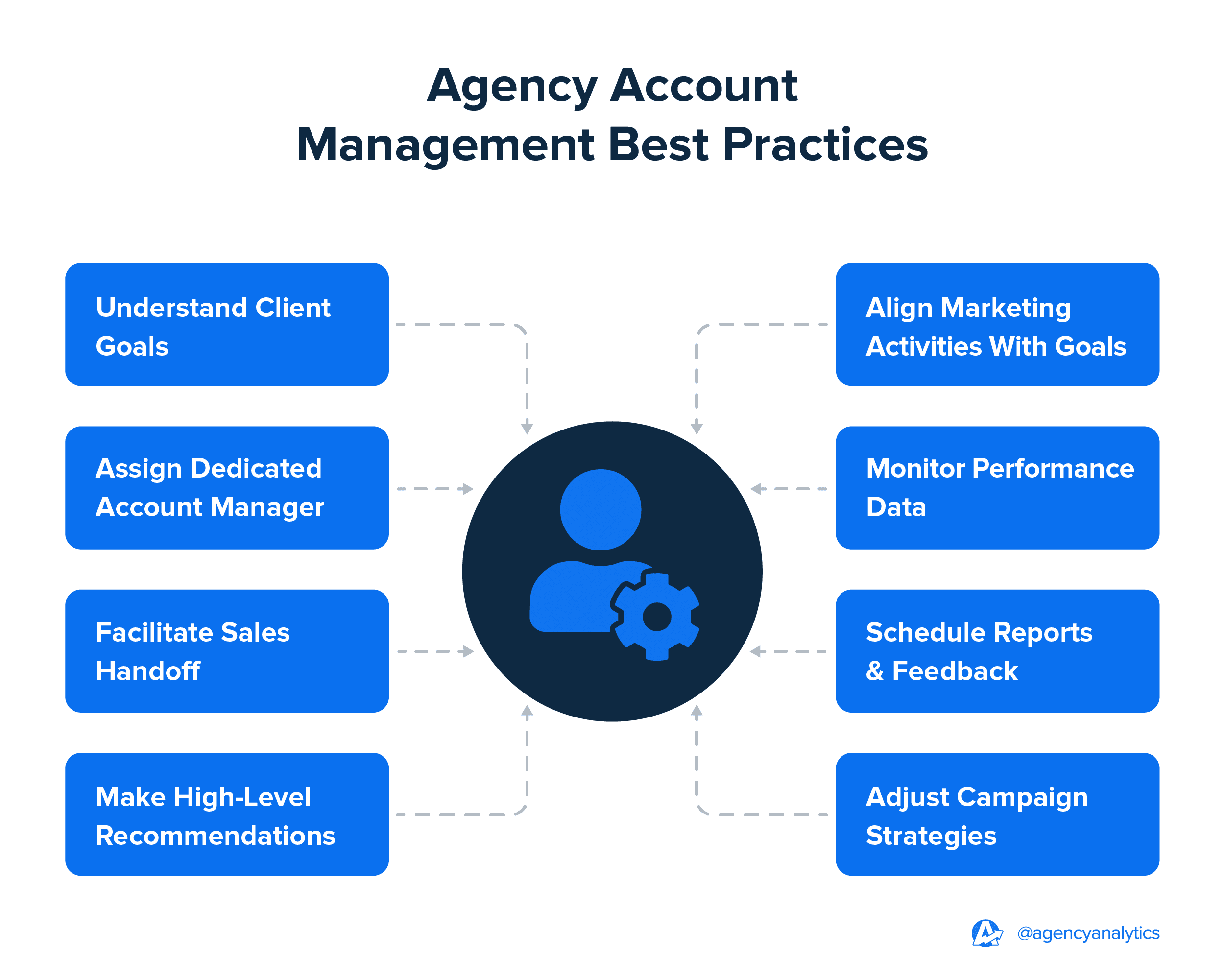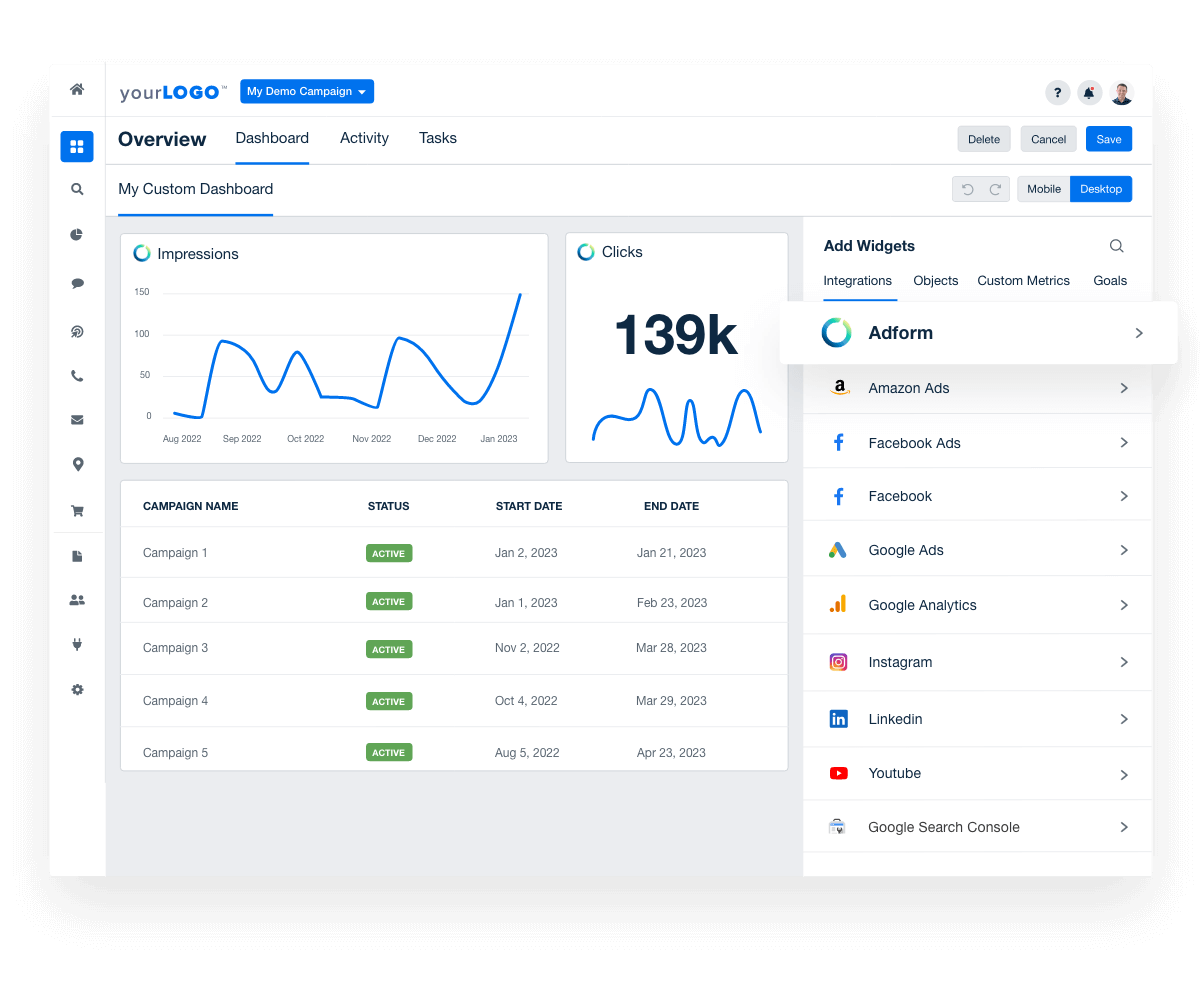Table of Contents
Table of Contents
- Why Strategic Account Management Matters For Agencies
- Expanding the Agency’s Focus on Strategic Account Management
- Tools and Techniques for Effective Strategic Account Management
- 5 Strategic Account Management Tactics To Build Client Relationships
- Harness Strategic Account Management To Boost Client Relationships
7,000+ agencies have ditched manual reports. You can too.
Free 14-Day TrialQUICK SUMMARY:
Discover how Jesse McFarland leveraged strategic account management (SAM) to transform his career from a fitness coach to a successful digital marketing agency owner. Learn how Jesse’s understanding of client needs enabled him to build strong, lasting relationships and grow his business. Discover key strategies for effective communication, delivering measurable results, and maintaining client satisfaction to help your agency enhance its services and boost client retention.
Imagine stepping into a gym, ready to tackle your fitness goals, but walking out with a masterclass in business growth instead. That’s exactly what happened to Jesse McFarland’s personal training clients.
The fitness training business Jesse ran back in the late-’00s quickly took off due to his trailblazing digital marketing efforts, which ranked him high in searches for personal trainers in Portland, Oregon.
At one point, I ranked number one for “personal training in Portland,” and I was beating 24 Hour Fitness and all these big places. My business blew up really quickly. My personal training clients were mostly business owners and our sessions went from “What else can I do to lose weight?” to “What are you doing to grow your business so fast?”
Jesse McFarland, Founder, SpearPoint Marketing
During training sessions, Jesse began to offer more than just fitness tips; he became a trusted business consultant for his clients who were interested in SEO. Jesse carried over the people skills he’d picked up as a trainer–taking conversations deep and being unafraid to get personal, all while maintaining unwavering focus on the achievement of the individual’s unique goals.
Much in the same way that a trainer plays a critical role in a client’s fitness story, Jesse knew that if he lent the same care and attention to SEO clients, he’d remain an essential part of their business success story–naturally increasing client loyalty over the long term.
When Jesse eventually launched his own agency, it was his focus on strategic account management (SAM) that quickly grew the business. Today, we’re exploring the effects of SAM on agency growth and client retention, and sharing Jesse’s top tips for implementing these strategies at your own agency.
Why Strategic Account Management Matters For Agencies
In 2010, Jesse left the fitness industry behind and joined his first SEO agency. Within three months, he was a manager. Over the next few years he worked for another startup where he acted as general manager. The startup’s success led it to be acquired by a larger company, which led Jesse to become Chief Marketing Officer.
As CMO, Jesse felt disconnected from the direct impact he initially had on clients. This was a significant factor in his decision to leave the role to found and manage his own agency, SpearPoint Marketing, in 2023.
Based in Denver, Colorado, SpearPoint Marketing caters primarily to B2B and ecommerce sectors. Leveraging his extensive network and reputation built over years in the digital marketing industry, Jesse quickly acquired clients for his new agency and re-focused his efforts on providing what had fueled his success in the first place: a strategic account management program.
For marketing agencies, key account management isn’t just a service approach; it’s a growth strategy. When agencies adopt SAM, they move beyond transactional relationships and towards becoming indispensable partners to their clients.
Here’s what this looks like in practice:
Deep Client Insights
Agencies begin to operate almost as an extension of their client’s team. By deeply understanding their client’s business, market, and competition, agencies anticipate needs and craft responsive strategies.
Customized Marketing Strategies
With a strong grasp of what the client needs, agencies tailor their marketing efforts more effectively. Whether a client is launching a new product, entering a new market, or rebranding, the agency is well-equipped to manage complex projects because they understand the bigger picture.
Enhanced Client Retention
Focusing on delivering real, measurable value helps build trust and loyalty. Clients are more likely to stick with an agency that demonstrates a commitment to their success over the long term.
Higher Client Satisfaction
Regular, strategic communication keeps clients feeling heard and understood. Open dialogue ensures the agency is always aligned with the client’s goals, which leads to higher satisfaction rates.
Increased Revenue Opportunities
As trust grows and the agency proves its strategic worth, clients are more open to exploring additional services the agency offers. This often leads to expanded contracts and more significant projects.
Competitive Advantage
Agencies that excel in SAM differentiate themselves from competitors who may not be as client-focused or strategic in their approach. This becomes a key selling point in attracting new clients.
By investing in strategic account management, marketing agencies transform client relationships into partnerships where both parties thrive. The agency becomes a vital component of their clients’ success, leading to more stable revenue streams and opportunities for growth.
If you can invest more on the account management side, you can prevent high churn rates and then grow your business off of that instead of focusing all on sales.
Jesse McFarland, Founder, SpearPoint Marketing
Expanding the Agency’s Focus on Strategic Account Management
Jesse’s transition from sales to overseeing strategic accounts involved a fundamental shift in how he engaged with his key customers.
As he explains, while working for the startup, “We went from $200,000 a year that first year to around five or six million in a few years.” This growth was achieved not by increasing the number of new clients, but by deepening the mutually beneficial relationships with key accounts and ensuring the agency’s services were indispensable to their success.
Jesse emphasizes that understanding client goals is crucial. “I always thought it’s the priority there because in the agency world, retention is always an issue,” he says.
By building an ideal client profile and getting to the heart of what these ideal clients truly need and expect, Jesse was able to tailor SpearPoint’s offerings to better align with those objectives and craft customized marketing strategies directly linked to his clients’ success metrics.

Jesse stresses the importance of identifying and placing dedicated skilled personnel in account management roles to ensure the agency’s representatives are able to manage day-to-day operations and make high-level recommendations that resonate with executives and decision-makers.
I’ve always wanted to have my best people in the account management position. That was always kind of a challenge because, traditionally, what most agencies do is they invest more into the technical side and then the strategic account managers are typically people right out of college with no experience and they have to figure it out.
Whether you’re a small business that’s paying a couple hundred dollars a month that you can barely afford or you’re a corporate business that’s spending $10,000 a month, you want to feel really confident in the person you’re talking to.
Jesse McFarland, Founder, SpearPoint Marketing
For SpearPoint, this has meant investing time into attracting and hiring top notch account managers, and then providing thorough training to ensure alignment with the agency’s SAM focus. Account managers are encouraged to truly understand the deeper needs of each client, and center those goals within every marketing project they undertake.
By aligning marketing activities with the client’s financial and strategic goals, Jesse ensured that every campaign moved the needle in terms of business outcomes, not just marketing metrics.
Doing so also requires a deep dive into analytics to understand which actions lead to desired results and adjusting strategies accordingly to maximize success.

Give clients access to their own custom marketing dashboard to show the value your agency provides. Try AgencyAnalytics free today!
Tools and Techniques for Effective Strategic Account Management
As Jesse evolved his approach to account management, he emphasized the use of certain tools and techniques that directly contribute to deepening client relationships and enhancing their outcomes.
From leveraging technology to embracing regular direct interactions, Jesse’s toolkit is rich with strategies that any agency leader can apply to elevate their client engagement.
Using Customer Relationship Management (CRM) Systems
Jesse understands the importance of keeping track of every client interaction to ensure seamless communication and project management. Having a CRM system to organize client data helps assign the right strategic account manager during the handoff from sales and track communications throughout the relationship.
Adopting Data-Driven Decision Making
Jesse emphasizes the importance of delivering services and tangibly demonstrating their value through concrete results. By using AgencyAnalytics dashboards, he makes sure every strategy implemented is measurable and aligned with the client’s goals, providing transparency and building trust.
The downfall for most agencies is that they lack the ability to really show the value of what they do to the customer, whether it’s through the person they’re using or how they display their metrics and data—or a combination of both.
Jesse McFarland, Founder, SpearPoint Marketing
Regular Strategy Meetings
To Jesse, regular meetings with clients are key. These aren’t mere check-ins—they’re opportunities to reassess strategies, integrate client feedback, and make necessary adjustments. This way, he ensures his agency’s strategic account management efforts are always in sync with the client’s current needs and future ambitions.
Continuous Learning
Staying updated with the latest marketing trends is a must. Jesse actively keeps himself and his team informed and skilled in the latest industry practices, ensuring their strategies are relevant and up-to-date.
Customized Service Offerings
Jesse knows that each client is unique and requires a tailored approach. He customizes his agency’s services to meet specific client demands, ensuring that each strategy is as effective as possible in addressing particular challenges and achieving targeted outcomes.
Impress clients and save hours with custom, automated reporting.
Join 7,000+ agencies that create reports in minutes instead of hours using AgencyAnalytics. Get started for free. No credit card required.
5 Strategic Account Management Tactics To Build Client Relationships
Jesse actively shapes his client relationships with a straightforward and practical approach that ensures each partnership is robust and productive. He employs a few key strategies that directly contribute to deepening these connections.
1. Focus on Empathetic Client Engagement
Account managers must listen carefully to each client to really understand their unique needs and goals. This helps them anticipate what the client needs and offer specific solutions that work.
Example: In an initial meeting, a digital marketing agency’s account manager discusses the goals and challenges with a local bakery owner keen on boosting their online visibility. The bakery specializes in custom cake designs using organic ingredients, a unique selling point that isn’t well-known in the neighborhood.
Through pointed questions about popular designs, customer feedback, and target demographics, the account manager gains a deep understanding of what makes the bakery special.
Armed with this insight, the agency crafts a targeted digital marketing strategy focused on storytelling through social media. They plan to showcase customer testimonials, highlight the craftsmanship behind each cake, and detail the quality of ingredients. A “Cake of the Month” feature is also introduced to engage the local community and drive interaction.
2. Emphasize Clear Communication to Clients
As part of a strategic account management plan, account managers should keep clients updated about what’s happening with their projects. Speak plainly, avoid complicated jargon, and explain any issues clearly. This keeps everyone on the same page, builds trust, and improves customer satisfaction.
Example: An advertising agency is tasked with revamping the branding for a mid-sized technology company. The agency’s project manager schedules regular update meetings and uses straightforward language to discuss progress, address potential setbacks, and clarify next steps, ensuring the tech company’s team understands each phase of the project.
During these updates, the project manager uses clear, concise explanations to detail why certain design choices were made, how they align with the company’s branding goals, and what the expected outcomes are. When challenges arise, such as delays in design approval or changes in project scope, these are communicated immediately, with explanations provided for how they impact the timeline and budget.
3. Demonstrate Value With Regular Reporting
Agencies should always show how their work benefits the client, like boosting sales or improving customer interaction. This makes it clear to clients what they gain from their investment.
Example: A marketing agency partners with a local retail store to enhance its online presence and boost ecommerce sales. The agency starts by analyzing the store’s previous marketing efforts, website traffic, and sales data to establish a clear baseline for measuring improvement.
Implementing a series of targeted digital marketing campaigns, the agency focuses on social media ads, SEO improvements, and an email marketing strategy to engage existing customers and attract new ones. Each action is tracked with clear metrics, showing real-time increases in website traffic, higher engagement rates, and a significant uptick in online sales.
Every month, the agency presents a detailed report to the retail store owner, highlighting the direct impact of the marketing efforts (i.e., a 40% increase in online sales and a 50% growth in customer engagement on social media platforms). This helps the store owner see the tangible benefits of their investment in the agency’s services, reinforcing the decision to extend the partnership for future campaigns.

Don’t spend hours manually collecting your client’s campaign data. Create and schedule automated reports in just a few clicks with AgencyAnalytics. Try it free today!
4. Provide a Personal Touch for Each Client
Agency leaders and dedicated strategic account managers should make their interactions with clients feel personal and genuine. Remembering small details about a client’s preferences or important dates shows that you value the relationship beyond just business.
Example: An agency’s account manager works closely with a client who runs a boutique clothing store. To make their interactions more personal and genuine, the account manager makes it a point to remember specific details about the client, such as the anniversary of the store opening.
During regular meetings, the account manager casually mentions upcoming trends that align with the client’s taste, recalling previous conversations where the client expressed a love for certain styles. They also ensure to send a congratulatory message on the anniversary of the store, suggesting creative marketing ideas to celebrate the milestone with store customers.
5. Solicit and Respond to Client Feedback
Regularly ask for feedback and use it to improve your agency's services. Showing clients that their input leads to real changes makes them feel valued and part of the process.
Example: An agency regularly solicits feedback from its clients at the end of each major project phase. They use simple, direct surveys and sometimes schedule brief feedback calls to ensure they capture the client’s thoughts and feelings about the process and results.
When a client mentions that they found the project updates too technical and difficult to understand, the agency immediately revises its communication approach. They start providing simpler, more concise updates with clear visuals that better explain the project’s progress and focus on customer success.
Create, monitor, and display clear goals with AgencyAnalytics dashboards to prove the value your agency delivers to its clients. Start your 14-day free trial today.
By focusing on these direct actions—listening, communicating clearly, demonstrating tangible value, personalizing interactions, and using feedback—agency leaders will ensure that strategic relationships are strong, trust-based, and mutually beneficial. This way, clients see the agency not just as a service provider, but as a key partner in their success.
Harness Strategic Account Management To Boost Client Relationships
Jesse McFarland’s approach to successful strategic account management has proven essential in transforming client relationships and fostering agency growth.
It’s always about taking care of the client. I would put more value into account management than my agency’s product because I’ve had situations where we’ve had an amazing product but we lacked the ability to show the value to the client.
Jesse McFarland, Founder, SpearPoint Marketing
For agency leaders, Jesse’s experiences highlight the importance of shifting from basic client service to strategic partnerships. This shift involves more than just managing client projects; it requires integrating the agency’s efforts deeply with client business goals.
Adopting Jesse’s approach means prioritizing client success as a pathway to the agency’s own success. It calls for a proactive strategy—anticipating client needs and adapting to change. By focusing on what truly drives client success, agency leaders build lasting relationships that extend beyond conventional service agreements.

Written by
Francois Marchand brings more than 20 years of experience in marketing, journalism, content production, and artificial intelligence (AI). His goal is to equip agency leaders with innovative strategies and actionable advice to succeed in digital marketing, SaaS, and ecommerce.
Read more posts by Francois MarchandSee how 7,000+ marketing agencies help clients win
Free 14-day trial. No credit card required.






